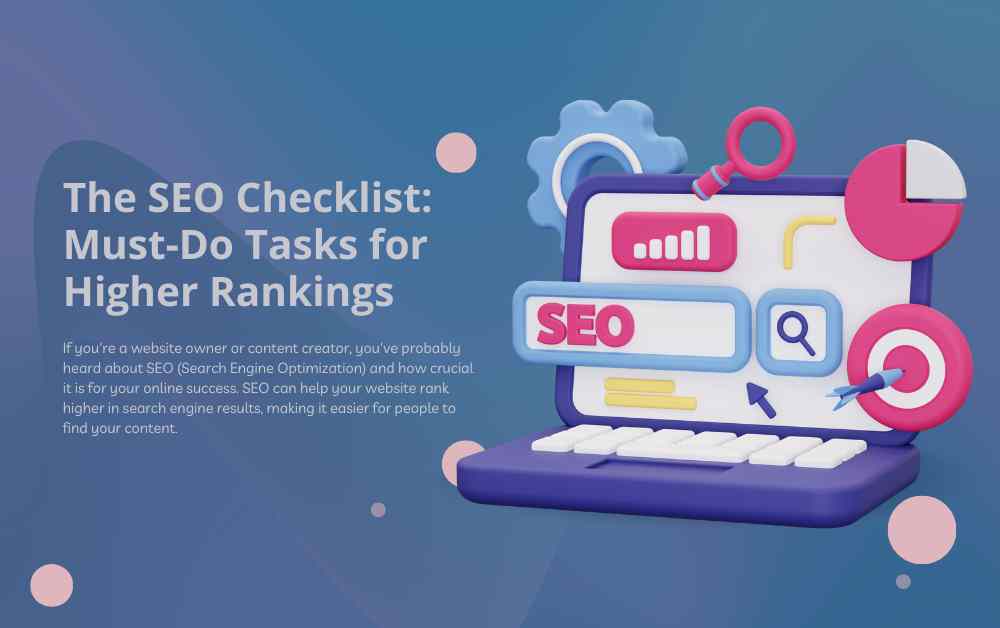If you’re a website owner or content creator, you’ve probably heard about SEO (Search Engine Optimization) and how crucial it is for your online success. SEO can help your website rank higher in search engine results, making it easier for people to find your content. However, SEO can seem overwhelming with all the technical jargon and constant algorithm updates. Discover the essential SEO tasks you need to boost your website’s rankings with our comprehensive SEO checklist. Whether you’re a beginner or looking to improve your existing SEO strategy, our guide simplifies the process for better search engine visibility.”
Technical SEO services play a pivotal role in optimizing your website’s structure and performance for search engines. This involves tasks like optimizing page speed, improving mobile-friendliness, and ensuring that search engine crawlers can easily navigate your site. Technical SEO also includes optimizing meta tags, schema markup, and ensuring proper URL structure. These elements may sound complex, but they’re essential for search engines to understand and rank your content effectively.
In this blog post, we’ll break down the essential SEO tasks you need to focus on in simple and easy-to-understand language, including Technical SEO Services. Whether you’re a beginner or just looking for a quick refresher, this SEO checklist will help you improve your website’s rankings and drive more organic traffic. By mastering both the technical and content aspects of SEO, you’ll be well on your way to achieving better visibility and success online.
Getting Started with SEO
Understanding SEO Basics
Before diving into the checklist, let’s understand the fundamental concepts of SEO. SEO is all about making your website more search engine-friendly to improve its visibility. Search engines like Google use complex algorithms to determine which websites rank higher in their search results. The ultimate goal of SEO is to make your website one of the top results when someone searches for relevant keywords.
Keyword Research
- Identify Relevant Keywords: Start by finding keywords related to your content or business. Use tools like Google Keyword Planner, Ahrefs, or SEMrush to discover relevant keywords that people are searching for.
- Long-Tail Keywords: Consider using long-tail keywords (phrases containing 3-4 words) as they often have less competition and can be more targeted.
On-Page SEO
On-page SEO refers to optimizing individual pages of your website to improve their search engine rankings.
High-Quality Content
- Create Valuable Content: The heart of SEO is quality content. Write informative, engaging, and unique articles or pages that cater to your target audience’s needs and interests.
- Keyword Placement: Place your target keywords naturally throughout your content. Avoid keyword stuffing, which can harm your rankings.
- Optimize Headings: Use descriptive H2 and H3 headings to organize your content. This makes it easier for both readers and search engines to understand your page’s structure.
Meta Tags
- Title Tags: Craft compelling and descriptive title tags for each page. Include your target keyword near the beginning of the title tag.
- Meta Descriptions: Write concise and enticing meta descriptions that summarize your page’s content. These descriptions can influence whether users click on your link in search results.
URL Structure
- User-Friendly URLs: Ensure your URLs are short, descriptive, and user-friendly. Avoid using long strings of numbers or irrelevant characters.
Image Optimization
- Image Alt Text: Add descriptive alt text to your images to improve accessibility and help search engines understand your content.
Internal Linking
- Link to Related Content: Include internal links within your content to guide users to other relevant pages on your website. This also helps search engines index your site more effectively.
Off-Page SEO
Off-page SEO involves activities outside of your website that influence your search engine rankings.
Backlinks
- Quality Backlinks: Earn high-quality backlinks from authoritative websites in your niche. These are like votes of confidence for your site’s credibility.
- Guest Posting: Contribute guest posts to reputable websites in your industry. This can help you build relationships, gain exposure, and acquire valuable backlinks.
Social Signals
- Social Media Presence: Maintain an active and engaging presence on social media platforms. Social signals, such as likes, shares, and comments, can indirectly impact your rankings.
Note:- SEO Services in Dubai offer expert search engine optimization solutions tailored to your business needs, helping you improve online visibility, attract more traffic, and boost your website’s performance in the competitive Dubai market.
Technical SEO
Technical SEO involves behind-the-scenes optimizations that enhance your website’s performance in search engine rankings. It ensures that search engine crawlers can efficiently navigate and index your site. Key aspects of technical SEO include mobile optimization, where your site should be responsive and user-friendly on mobile devices. Page speed optimization is crucial for faster loading times, reducing bounce rates and improving rankings. Submitting an XML sitemap helps search engines understand your website’s structure, aiding in more effective crawling and indexing.
Installing an SSL certificate to enable HTTPS not only secures your site but also aligns with search engine preferences. A user-friendly navigation system and overall site structure are essential for a positive user experience and improved SEO. Technical SEO ensures that your website operates seamlessly, making it easier for search engines to recognize and recommend your content to users. These technical optimizations work with on-page and off-page SEO efforts to boost your website’s visibility and rankings in search results.
Technical SEO focuses on the technical aspects of your website that affect its search engine performance.
Mobile Optimization
- Mobile-Friendly Design: Ensure your website is responsive and provides an excellent user experience on mobile devices. Google prioritizes mobile-friendly sites.
Page Speed
- Faster Loading Times: Improve your website’s loading speed. Slow websites can lead to higher bounce rates and lower rankings.
XML Sitemap
- Sitemap Submission: Create and submit an XML sitemap to search engines. This helps them crawl and index your site more efficiently.
Secure Website (HTTPS)
- SSL Certificate: Install an SSL certificate to make your website secure with HTTPS. Secure sites are favored by search engines.
User Experience (UX)
- User-Friendly Navigation: Design your website for an intuitive user experience. Easy navigation and a clear structure benefit both users and search engines.
Monitoring and Analytics
SEO is an ongoing process, and it’s essential to monitor your efforts and analyze the results.
Google Analytics
- Set Up Google Analytics: Install Google Analytics to track your website’s performance, including traffic, user behavior, and conversions.
Google Search Console
- Use Google Search Console: Monitor your site’s presence in Google search results, identify issues, and submit sitemaps.
Content Updates and Maintenance
- Regular Content Updates: Keep your website fresh by updating and adding new content regularly. Fresh content can attract both users and search engine crawlers.
- Broken Links: Periodically check for and fix broken links on your site to ensure a smooth user experience.
Conclusion
By following this simplified SEO checklist, you can take significant steps towards improving your website’s rankings in search engine results. Remember that SEO is an ongoing process, and it may take some time to see substantial results. Be patient, stay committed to providing value to your audience, and keep optimizing your site to stay ahead in the competitive online landscape. SEO doesn’t have to be complicated; it’s about making your website better for both search engines and users. Start implementing these tasks, and you’ll be on your way to higher rankings and increased organic traffic. Good luck!
Read the next blog – Engaging and Selling Through Social Media Marketing Company in Dubai




